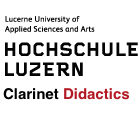Eli Eban: Unterschied zwischen den Versionen
Aus Cladid-Wiki
Keine Bearbeitungszusammenfassung |
Keine Bearbeitungszusammenfassung |
||
| Zeile 7: | Zeile 7: | ||
''HM: After the Interviews with colleagues in Switzerland, France, Germany and Austria, I now want to focus on the traces of the old French School in the USA. In the beginning of the 20th century, important French clarinet teachers came to the States and had big influence on the clarinet playing of the of the following generations. Interestingly, the development of the French school in Europe took a significantly different course.'' | ''HM: After the Interviews with colleagues in Switzerland, France, Germany and Austria, I now want to focus on the traces of the old French School in the USA. In the beginning of the 20th century, important French clarinet teachers came to the States and had big influence on the clarinet playing of the of the following generations. Interestingly, the development of the French school in Europe took a significantly different course.'' | ||
<br> | </br> | ||
EE: Right. | EE: Right. | ||
[[Kategorie:English|Eban, Eli]] | [[Kategorie:English|Eban, Eli]] | ||
[[Kategorie:Interviews|Eban, Eli]] | [[Kategorie:Interviews|Eban, Eli]] | ||
Version vom 13. Mai 2020, 12:48 Uhr
The interview with Eli Eban Eli Eban. [1] orchestral soloist, recitalist, chamber musician and professor at Bloomington School of Music was held on 22 June with a telephone call from Zug, Switzerland, to Baltimore, USA and was edited by Heinrich Mätzener.
On the tracks of the old French School
HM: After the Interviews with colleagues in Switzerland, France, Germany and Austria, I now want to focus on the traces of the old French School in the USA. In the beginning of the 20th century, important French clarinet teachers came to the States and had big influence on the clarinet playing of the of the following generations. Interestingly, the development of the French school in Europe took a significantly different course.
EE: Right.
